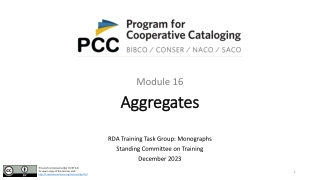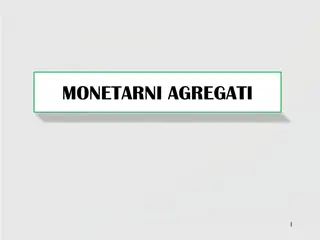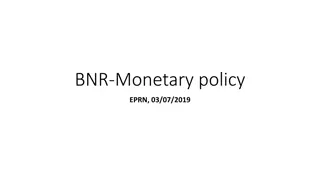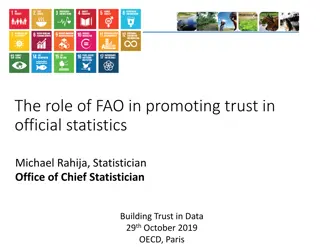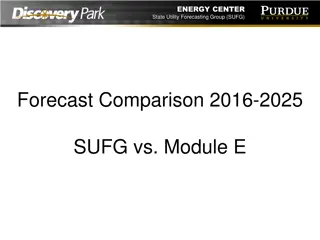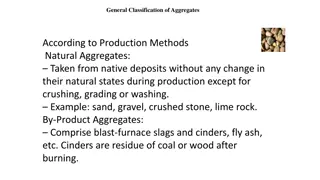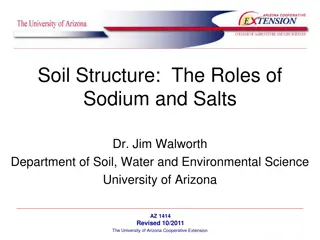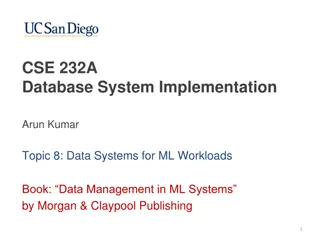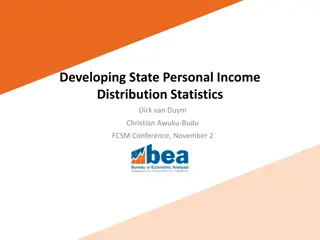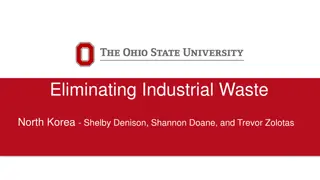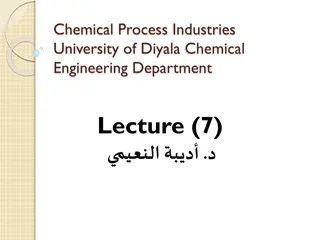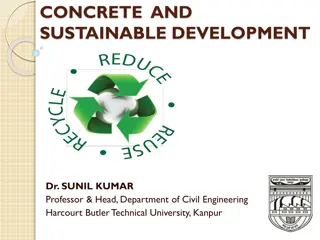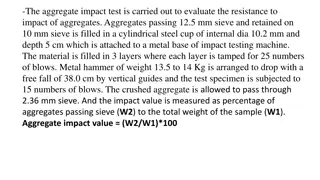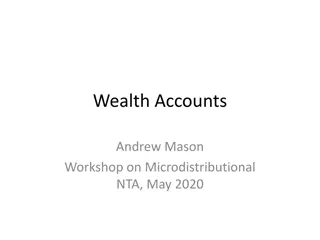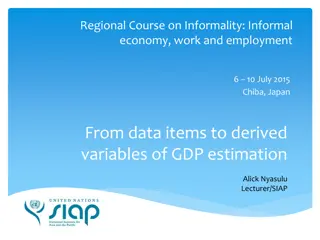Understanding Aggregates in RDA Training: A Comprehensive Overview
Explore the concept of aggregates in RDA training through this detailed module covering types of aggregates, LRM model, user-driven examples, and considerations in describing aggregates. Gain insights into collection, augmentation, and parallel aggregates with practical scenarios.
2 views • 40 slides
Can Financial Engineering Help Save the Planet?
Explore the potential of financial engineering in combating climate change through carbon-linked bonds. Dive into the concept of scaling low carbon investments, optimizing portfolio allocations, and creating credibility using financial tools. Discover how the Carbon Barometer aggregates data to trac
0 views • 13 slides
Understanding Macro Economics: Importance and Significance
Macro economics, a vital field originating with the Mercantilists and further developed by J.M. Keynes, focuses on studying the economy as a whole. It encompasses aggregates like national income, employment, output, and investment, providing insights into economic fluctuations, unemployment, inflati
0 views • 6 slides
Overview of Monetary Aggregates in Bosnia and Herzegovina
Image descriptions and explanations about monetary aggregates, money as a payment instrument, cash in circulation, deposit money, M1, M2, M3 categories, and monetary base. Additionally, details on net foreign assets, net reserves, and changes in monetary policy affecting currency board arrangements
1 views • 17 slides
If you are looking for Concrete Contractor in Mauku
If you are looking for Concrete Contractor in Mauku, LDH Concrete and Excavations is your trusted partner for all concrete and excavation needs. With over 10 years of experience, we serve Patumahoe and the entire Auckland region. Our team of expert concrete layers and excavators can assist you with
0 views • 6 slides
Understanding Money and Monetary Policy in Economics
Money serves as a medium of exchange, store of value, and unit of account in an economy. It is vital for economic transactions and stability. The quantity of money is measured using concepts like liquidity and monetary aggregates. The demand for money is linked to the Quantity Theory of Money, which
2 views • 12 slides
Promoting Trust in Official Statistics: FAO's Role and Strategies
FAO plays a crucial role in promoting trust in official statistics by assessing quality through technical controls, producing international standards, conducting user surveys for feedback, and advocating for transparency. Capacity building and highlighting NSS contributions are essential for generat
0 views • 5 slides
Understanding Rocks and Minerals: Types and Formation
Rocks and minerals are natural substances with distinct characteristics. Rocks are solid aggregates of minerals or mineraloids, while minerals are naturally occurring chemical compounds. There are three main types of rocks: igneous, sedimentary, and metamorphic, each formed through different process
0 views • 16 slides
Comparison of Energy Forecasts: SUFG vs. Module E 2016-2025
Energy Center State Utility Forecasting Group (SUFG) provides state-level load forecasts using zonal factors, while Module E aggregates owner-level loads. SUFG historical peak demand data and gross/net load forecasts are compared against Module E for LRZ levels. Detailed charts and images showcase t
0 views • 14 slides
Comprehensive Classification of Aggregates and Their Characteristics
Classification of aggregates based on production methods (natural, by-product, processed, colored), petrological characteristics (igneous, sedimentary), and particle size (fine aggregate, coarse aggregate). Examples and images are included for better understanding.
0 views • 5 slides
Overview of Jejunum and Ilium Histology and Vascular Supply
The jejunum and ileum are segments of the small intestine with distinct features in terms of position, diameter, wall thickness, and lymphoid aggregates. They receive arterial blood supply from branches of the superior mesenteric artery and drain into various venous tributaries. Histologically, the
0 views • 14 slides
Understanding the Role of Sodium and Salts in Soil Structure
Soil structure plays a crucial role in plant growth, water movement, and drainage. Excess sodium can cause clay particles to disperse, leading to reduced water infiltration. Flocculation, which involves cations like calcium and magnesium, helps clay particles stick together to form aggregates, impro
0 views • 29 slides
Data Systems for Machine Learning Workloads and Advanced Analytics
This content explores the intersection of database systems with machine learning workloads, covering topics such as big data systems, ML lifecycle tasks, popular forms of ML, and data management concerns in ML systems. It delves into the importance of ML systems for mathematically advanced data anal
0 views • 21 slides
Developing State Personal Income Distribution Statistics
This project aims to create a distributional account for State Personal Income, allowing for the analysis of inequality by state and over time. Using various data sources such as BEA aggregates and IRS statistics, the distributional model provides insights into state-level income inequality. Census
0 views • 17 slides
Sustainable Solutions for Industrial Waste Management
Industrial waste poses environmental challenges, but innovative approaches such as reusing waste, developing eco-friendly cement blocks, and incorporating by-products like recycled concrete aggregates offer promising solutions to reduce waste and emissions. These methods help create a more sustainab
0 views • 16 slides
Evolution of Concrete in the Chemical Process Industries
Cement and concrete have a rich history dating back thousands of years. Cement was used by ancient civilizations like the Egyptians, Assyrians, Babylonians, and Romans. Concrete, which is a mixture of aggregates bonded by cement and water, revolutionized architecture during the Roman Empire. The int
0 views • 12 slides
Concrete and Sustainable Development in Civil Engineering by Dr. Sunil Kumar
Dr. Sunil Kumar from Harcourt Butler Technical University, Kanpur, discusses concrete as a conglomerate rock with large aggregate particles in a paste matrix. Sustainable development involves remedying past mistakes, avoiding pollution, and balancing development with environmental preservation. The
0 views • 17 slides
Influence of Group and Culture on Human Personality Development
Society functions as a cohesive unit composed of smaller social groups that interact and shape individuals' psycho-social development. The difference between mechanical aggregates and psycho-social units lies in the emotional connections and responsibilities present in the latter. Groups like family
0 views • 8 slides
Aggregate Impact Test Procedure and Apparatus Overview
The aggregate impact test is conducted to assess the resistance to impact of aggregates. This involves filling a steel cup with aggregates, tamping them, and subjecting them to impacts from a standard weight hammer. The resulting crushed aggregate is sieved to determine the impact value. The detaile
0 views • 4 slides
Understanding Wealth Accounts and Transfer Wealth in Microdistributional NTA
Wealth accounts in the context of Microdistributional NTA classify wealth by sector (public and private) and age, depicting opening and closing balances along with net changes over a period. A simple NTA private asset account aggregates private assets by age, showcasing opening, net changes, and end
0 views • 5 slides
Understanding the Five Aggregates in Buddhism
Explore the concept of the Five Aggregates (Skandha) in Buddhism, which deconstructs the notion of a permanent self by breaking down personal identity into form, sensations, perception, mental formations, and consciousness. Through this lens, the impermanence and interconnectedness of all phenomena
0 views • 25 slides
Understanding Informal Economy and GDP Estimation Methods
This informative content covers a regional course on informality, focusing on the informal economy, work, and employment. It discusses using data items to derive variables for GDP estimation, learning objectives related to GDP questionnaire entries, conceptual foundations of the informal economy, GD
0 views • 11 slides
